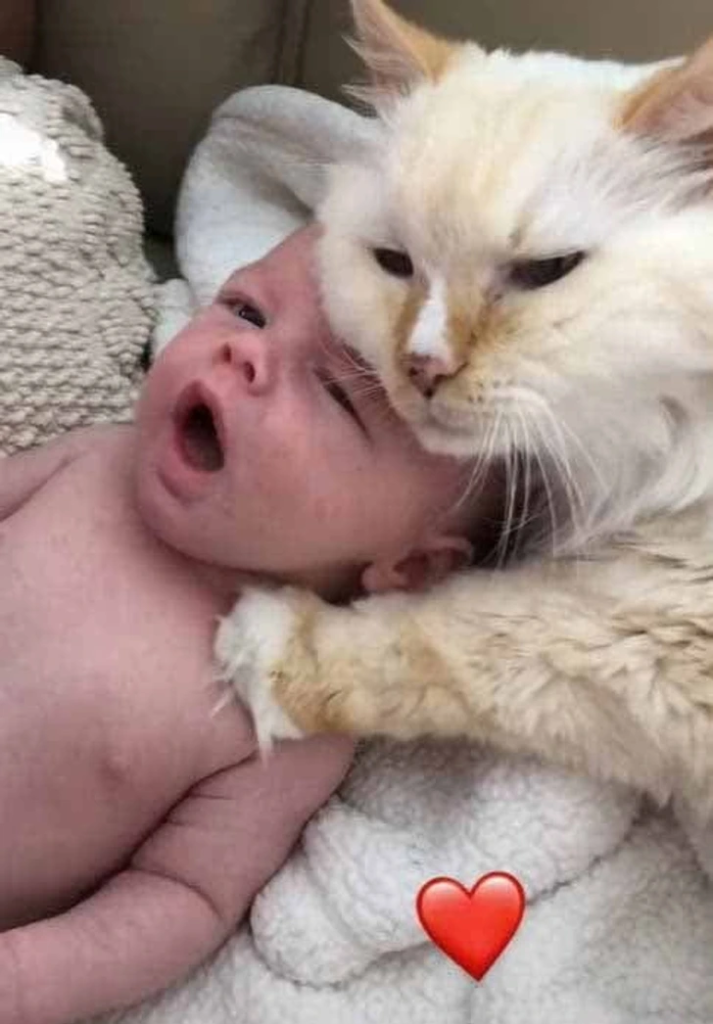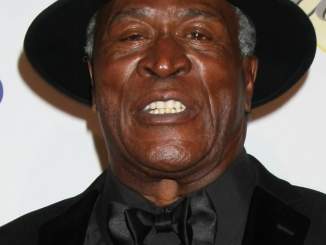In the world of pet companionship, dogs often steal the spotlight for their perceived loyalty and affection towards humans, especially babies. Cats, on the other hand, have long been labeled as solitary and indifferent. But a heartening video shared on TikTok challenges this stereotype, showcasing the remarkable bond between a protective feline named Teddy and his human baby brother, William.
A bond that started from day one.

From the moment William entered the household, Teddy, the family cat, embraced him with open paws, assuming the role of a caring and watchful «big brother.» Contrary to expectations, Teddy didn’t display an ounce of jealousy but instead showered the newborn with affection and protection, much to the delight and surprise of his owners.
Capturing these precious moments on camera, William’s parents shared their growing friendship on TikTok, where it quickly gained attention from viewers worldwide. In the videos, Teddy is seen gently interacting with William, ensuring his safety and even playfully engaging with him in his baby seat. It’s evident that Teddy sees William as his own, forming an inseparable bond that transcends species.
One video went viral.

William and Teddy’s TikTok videos are a massive hit, with one in particular reaching almost 12 million views. Witnessing the cat’s tender and affectionate behavior towards the baby brings joy to all who watch their interactions. Whether it’s sleeping next to him, keeping watch over his dreams, or delicately holding him with his paws, the cat’s unwavering commitment to the baby is evident. Refusing to leave his side, the cat seems to intuitively understand the fragility and vulnerability of the little one, embodying a protective presence that touches the hearts of all who witness their bond.
Happy comments flooded in.

The touching videos shared by William’s parents evoke a range of emotions from viewers, with many expressing admiration for Teddy’s unwavering devotion to his baby brother. Comments flooding the videos reflect the universal appeal of their bond, with some jokingly suggesting that William may have become Teddy’s surrogate. «Could anything be more precious?» one user mentioned. Indeed, Teddy’s nurturing instincts and affectionate behavior have earned him the title of a first-rate babysitter in the eyes of his adoring fans.
While others worried about the cat and baby close together.

Some people expressed concerns about allowing pets near newborns. In one of the videos, we can see comments saying «Please be careful.» Allowing cats near babies is a matter of personal choice and depends on various factors, including the temperament of the cat, the health and safety concerns of the baby, and the supervision provided by the parents or caregivers.
While many cats can coexist peacefully with newborns and even develop strong bonds with them, it’s essential to exercise caution and take appropriate precautions to ensure the safety of both the baby and the cat. However, Teddy and William’s interactions challenge preconceived notions about cats’ personalities and showcase the depth of empathy and compassion these creatures are capable of displaying.

As Teddy continues to watch over William, offering comfort and companionship in his own feline way, their story serves as a heartening reminder of the transformative power of love, transcending boundaries of species and age. In a world often divided by differences, the pure and unconditional bond between a cat and a baby provides hope and warmth, reminding us of the inherent goodness that exists within us all.
Preview photo credit williamandteddy / TikTok, williamandteddy / TikTok
A famous star was hospitalized.

A representative for Oprah Winfrey just revealed on Instagram that the author will be making an appearance on CBS Mornings to discuss her most recent book recommendation.Sadly, over the weekend, the well-liked host contracted a stomach virus.Gayle King assumed command and gave the reason behind Winfrey’s absence.A spokesman for Winfrey told CNN in a statement on Tuesday that “Ms. Winfrey is recovering from a stomach virus and was given an IV due to dehydration at the recommendation of her doctor.”

“She is getting more rest and improving every day.”Winfrey admitted to her best friend and journalist that she “couldn’t keep enough water down to stay hydrated” in a video chat that was shared on Gayle King’s Instagram page. This ultimately caused Winfrey to visit the hospital.King assured viewers that despite the health setback, Winfrey will eventually “be OK.”

She said, “I hope sharing that detail doesn’t bother her.”During a joint interview with the New York Times in January, Winfrey and King expressed their deep relationship and gave one other high accolades.She tells the truth with brutality. Even if it’s not what you want to hear,” King once observed in reference to Winfrey.

“[We] really, really enjoy each other.”In January of last year, Winfrey demonstrated that, at seventy, she is still in excellent physical shape.The media titan was seen running on the beach with her dog and another woman in the footage that she shared on Instagram.She thanked everyone who had sent her birthday greetings in the caption, praising health as the greatest gift.



Leave a Reply